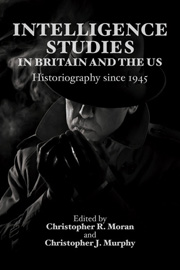Book contents
- Frontmatter
- Contents
- The Editors
- The Contributors
- List of Figures
- Preface
- Acknowledgements
- Introduction: Intelligence Studies Now and Then
- Part I AMERICAN INTELLIGENCE HISTORIOGRAPHY
- 1 CIA History as a Cold War Battleground: The Forgotten First Wave of Agency Narratives
- 2 The Culture of Funding Culture: The CIA and the Congress for Cultural Freedom
- 3 ‘Real Substance, Not Just Symbolism’? The CIA and the Representation of Covert Operations in the Foreign Relations of the United States Series
- 4 Bonum Ex Malo: The Value of Legacy of Ashes in Teaching CIA History
- 5 Narrating Covert Action: The CIA, Historiography and the Cold War
- 6 FBI Historiography: From Leader to Organisation
- 7 Reconceiving Realism: Intelligence Historians and the Fact/Fiction Dichotomy
- 8 The Reality is Stranger than Fiction: Anglo-American Intelligence Cooperation from World War II through the Cold War
- Part II BRITISH INTELLIGENCE HISTORIOGRAPHY
- Index
4 - Bonum Ex Malo: The Value of Legacy of Ashes in Teaching CIA History
from Part I - AMERICAN INTELLIGENCE HISTORIOGRAPHY
Published online by Cambridge University Press: 05 October 2013
- Frontmatter
- Contents
- The Editors
- The Contributors
- List of Figures
- Preface
- Acknowledgements
- Introduction: Intelligence Studies Now and Then
- Part I AMERICAN INTELLIGENCE HISTORIOGRAPHY
- 1 CIA History as a Cold War Battleground: The Forgotten First Wave of Agency Narratives
- 2 The Culture of Funding Culture: The CIA and the Congress for Cultural Freedom
- 3 ‘Real Substance, Not Just Symbolism’? The CIA and the Representation of Covert Operations in the Foreign Relations of the United States Series
- 4 Bonum Ex Malo: The Value of Legacy of Ashes in Teaching CIA History
- 5 Narrating Covert Action: The CIA, Historiography and the Cold War
- 6 FBI Historiography: From Leader to Organisation
- 7 Reconceiving Realism: Intelligence Historians and the Fact/Fiction Dichotomy
- 8 The Reality is Stranger than Fiction: Anglo-American Intelligence Cooperation from World War II through the Cold War
- Part II BRITISH INTELLIGENCE HISTORIOGRAPHY
- Index
Summary
In June 2007, Doubleday – a popular imprint of the Random House publishing empire – published The New York Times journalist Tim Weiner's Legacy of Ashes, portentously subtitled The History of the CIA. It is no exaggeration to describe the appearance of this book as a seminal event in US intelligence historiography, though perhaps not in the way that Mr Weiner intended (see Figure 6).
Historians and other scholars of intelligence will recall that the initial laudatory reviews of Legacy of Ashes – many of which were written by journalists like Weiner – were followed several months later by decidedly critical reviews written either by academic specialists in intelligence or by career intelligence officers, including a few, like myself, who have a foot in both worlds. My review of Weiner's book in the Fall 2007 issue of Studies in Intelligence – the CIA's inhouse journal, whose unclassified issues have a dedicated following among the cognoscenti of intelligence – was an early critical treatment and, thereby, became somewhat notorious, but it was by no means alone in asserting that Weiner had written a biased work of flawed scholarship. Without addressing my substantial objections regarding the book's many factual inaccuracies and its unremittingly negative perspective brought about by a tendentious use of sources, Weiner simply dismissed my review as ‘a malicious attack’ that began ‘a poison-pen campaign’ taken up by others against his book.
- Type
- Chapter
- Information
- Intelligence Studies in Britain and the USHistoriography since 1945, pp. 90 - 110Publisher: Edinburgh University PressPrint publication year: 2013



